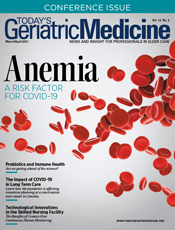
March/April 2021
The Last Word: Alzheimer's Patients in the COVID Era Why Back to Basics Is Best The COVID-19 pandemic has placed a great deal of stress on the minds and bodies of people across the globe, severely influencing the mental health of millions. But what’s often overlooked are the unique challenges the pandemic has placed on patients with Alzheimer’s disease. With nearly 5.6 million Americans aged 65 and older battling Alzheimer's, it’s safe to say that this disease affects a large amount of our population, not to mention one of the most vulnerable communities, just as COVID-19 does. So how can we as health care professionals help our patients prevent the risk of developing Alzheimer’s while the world is in one of the most stressful climates we will ever face? The answer is to go back to the basics and promote simple tasks that may boost their brain's overall strength and health. Alzheimer’s is a cognitive disease that attacks the brain and results in severe memory loss and dementia. The COVID-19 pandemic also affects the mental health of millions of Americans from its severe death toll and unprecedented stress on the health care community. Both diseases are having an impact on the brain and influencing its cognitive processing ability, making it all the more important to encourage patients to return to the basics of self-care. Because both diseases affect the brain and its cognitive processing ability, brain-boosting activities—which are often everyday tasks we simply don’t use or enforce often enough—may help keep the brain healthy and make it stronger, which is especially important during the pandemic. The first brain-boosting activity I recommend to patients is to simply stay active. By getting their bodies moving, they can boost blood flow to the brain in order to maintain the size of the hippocampus—the powerhouse for memory and learning. While remaining active is proving to be more difficult during the COVID-19 pandemic, it’s important that health care professionals encourage patients to take daily walks or exercise daily stretching in their homes. What they eat is just as important as aerobic exercise, which is why my second recommendation is to encourage patients to increase intake of leafy green vegetables such as kale, spinach, and collard greens, each of which are rich in vitamins such as folate, carotenoids, and flavonoids, which have been directly linked to lowering the risk of dementia and cognitive decline. If Alzheimer’s patients can change the way they eat, they may be able to change the way they feel. Mental health may be the most important brain booster of all. Especially during the pandemic, it’s more important than ever to remind patients to take care of their minds, and not just their bodies. With multiple stresses the pandemic has brought, it’s important that patients understand the importance of relaxing their minds by engaging in restorative activities. These include stress alleviators such as meditation, brain tapping, reading, and listening to music. All of these should be properly implemented in Alzheimer’s care facilities or Alzheimer patients’ homes. These activities both engage and relax the mind at the same time, allowing patients to escape what’s going on around them while also strengthening their brain muscles and overall cognitive ability. These simple activities will not only help alleviate the mental stressors the COVID-19 pandemic is placing upon us but also help fight memory loss, improve mental clarity, and ward off Alzheimer’s. — Patrick K. Porter, PhD, is an award-winning author and speaker who has devoted his career to neuroscience and brainwave entrainment. As the creator of BrainTap (braintap.com), he has emerged as a leader in the digital health and wellness field. BrainTap’s digital tools and mind development apps use creative visualization and relaxation, biohacking techniques that have made tremendous advances in helping mental, physical, and emotional health issues. BrainTap has been praised for helping people relieve symptoms associated with stress, insomnia, pain, and much more. |
